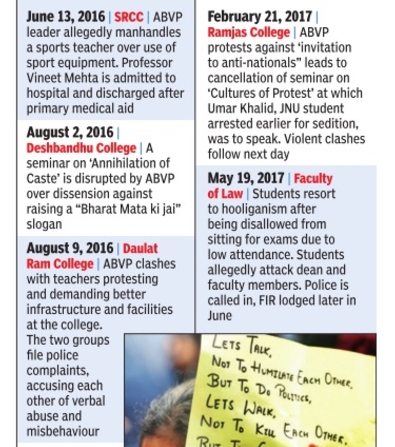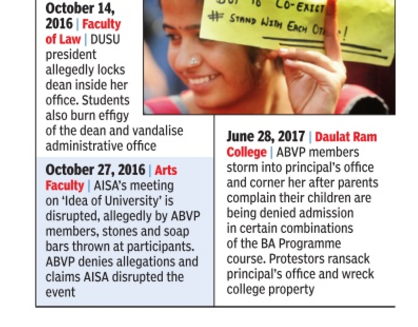Delhi University: history
This is a collection of articles archived for the excellence of their content. |
This page is under construction
Contents |
Four-year undergraduate programme (FYUP)
Sequence of events 2013-14
Vice Chancellor Dinesh Singh's attempt to synchronise DU's undergraduate course with international norms met with fierce resistance and the FYUP was scuttled in June 2014 after a year-long conflict between its supporters and opponents.
Here is the background and sequence of events:
10 things you must know about Delhi University’s four-year undergraduate programme
The Times of India TNN | Jun 25, 2014
Since 2013, Delhi University's four-year undergraduate programme has been in the news for various reasons. City-wide protests by students and teacher organizations, the fact that DU in fact admitted students into the programme in 2013 despite the uproar, and finally the stepping in of University Grants Commission (UGC) to scrap FYUP are the key highpoints underlining this controversial programme.
In June 2014, Delhi University colleges, slowly but surely started switching back from the controversial four-year undergraduate programme (FYUP) to the three-year course. 57 of the university's 64 colleges quietly communicated to UGC that they were moving back to the three-year course.
Here are 10 facts about the controversy surrounding DU's FYUP programme:
1) The Delhi high court in June 2014 fixed the petition on the FYUP-UGC issue for hearing on July 1.
2) 57 of the university's 64 colleges have 'quietly' communicated to UGC that they were moving back to the three-year course. These colleges include Hindu College, Lady Shri Ram, Shri Ram College of Commerce, Miranda House, Venkateswara and Kirori Mal. UGC followed up by asking DU authorities to immediately write to these colleges to begin admission under the three-year programme.
3) Meanwhile, UGC's missive to DU to ask colleges to begin admission under the three-year course could result in another war of nerves. Late in the evening, VC Dinesh Singh, pro-VC Sudesh Pachauri, registrar Alka Sharma and other officials reportedly met to plan their next move. University authorities, sources said, refused to take UGC's latest letter.
4) Responding to the anxiety of BTech students, whose course will be scrapped under the three-year graduation system, UGC said, "Students who feel they will be denied a BTech degree if the three-year course is introduced should not worry. Their interest will be fully safeguarded. They are being egged on by the DU authorities to agitate."
5) Delhi University administration's refusal to officially clarify anything relating to the current admission mess is leaving many DU hopefuls — especially those from other cities-in the lurch. DU admissions were to begin on June 24.
6) The Supreme Court on Tuesday declined to entertain a petition challenging the University Grants Commission's direction to Delhi University to scrap the four-year undergraduate programme (FYUP). Instead, a bench comprising Justices Vikramjit Sen and S K Singh suggested to the petitioner, Aditya Narayan Mishra, who is an assistant professor at Aurobindo College, to approach Delhi high court first.
7) Delhi University VC Dinesh Singh's fate hangs in the balance as it is not clear whether he has resigned or not. DU spokesman Malay Neerav texted a one-line message which said, "VC has resigned". This was followed by 'news' of the resignations of DU proVC Sudesh Pachauri and dean Umesh Rai. Since the VC's resignation had to come to the HRD ministry, officials there got into a huddle to finalize their next move. But as minutes and hours went by, Singh's resignation did not reach the ministry. "DU VC is playing a mind-game and successfully managed to spend another day without bothering about the fate of students," said a ministry official.
8) Protests continue to take place in DU. Those in favour of FYUP want to keep the pressure on; so they — mainly teachers' group like Academics for Action and Development (Aditya Mishra) — sat on a hunger strike. As news of the VC's resignation — which later turned out to be dubious — spread, there were celebrations and exchange of congratulatory messages.
9) Many are shocked at UGC's U-turn on FYUP that came into force in the last academic session. UGC along with a set of HRD officials, led by present education secretary Ashok Thakur, was at the forefront of celebrating FYUP last year. Not long ago, UGC chairperson Ved Prakash at a function in DU campus showered praise on VC Dinesh Singh and FYUP.
10) There seems to be no agreement between the central and state leaderships of Congres on the issue of rollback of FYUP. Senior Congres leader Ghulam Nabi Azad described UGC's directive as a decision taken in "haste" while another Congres leader, Manish Tewari, accused the NDA-led Central government of "trampling (on) and trifling (with)" the autonomy of a premium academic institution like Delhi University.
How the FYUP was scuttled: June 2014
Old letter won UGC FYUP war
Akshaya Mukul New Delhi
The Times of India Jun 28 2014
In the war of nerves that played out for a week, a single letter of July 30, 2013 written by a junior HRD ministry official to the registrar of Delhi University helped the University Grants Commission win the battle over the Four Year Undergraduate Programme (FYUP). In the letter, the junior woman official raised questions that seniors in the minis try had overlooked or willfully ignored. Reminding the registrar that ordinances of university are submitted to university court and the visitor after the approval of the executive council, she told the university that it was not clear if approval of the EC in May and June, 2013 was placed before the university court.
She also told DU registrar that Baccalaureate degree under FYUP exists in booklet of ordinances despite the fact that the university had informed the ministry that such a degree is being dropped. DU was asked to clarify on these matters and also send resolution of the academic council/executive council and university court on the amendments to the ordinanc es. On its part, the DU administration chose to completely disregard the ministry’s letter. Visitor’s approval would not have happened without these documents.
It also made FYUP illegal.
In the current imbroglio, every time UGC asked DU to furnish proof of Visitor’s approval or reply to HRD’s communication of July 30, 2013, university obfuscated it by stating that it is a Left conspiracy. “We were on facts, DU alleged conspiracy. We knew it will be a tough battle. DU ignored our repeated directives and tried to expand the scope of the subject by bringing in issues extraneous to FYUP. For commission it was an illegal course and had to be scrapped,” one UGC official said.
However, on Thursday, UGC nearly succumbed to the proposal of some academicians considered close to vice-chancellor Dinesh Singh. The proposal was for blending three-year undergraduate courses with FYUP. After intense discussion, the commission felt that in the larger interest of students it should accept the proposal for three-years honours/pass course and keep some courses, especially in science and technology, under FYUP.
After being finalized, UGC’s reply was shown to a lawyer who asked how can the commission declare FYUP to be illegal on one hand and accept parts of it on the other. More discussions followed and it was decided that DU proposal should be rejected completely. UGC took few more hours to firm up its directive to DU. With students and teachers agitating on the streets and more than a lakh admission-seekers facing Delhi heat and uncertainty in DU, the university administration finally succumbed on the morning of June 27.


